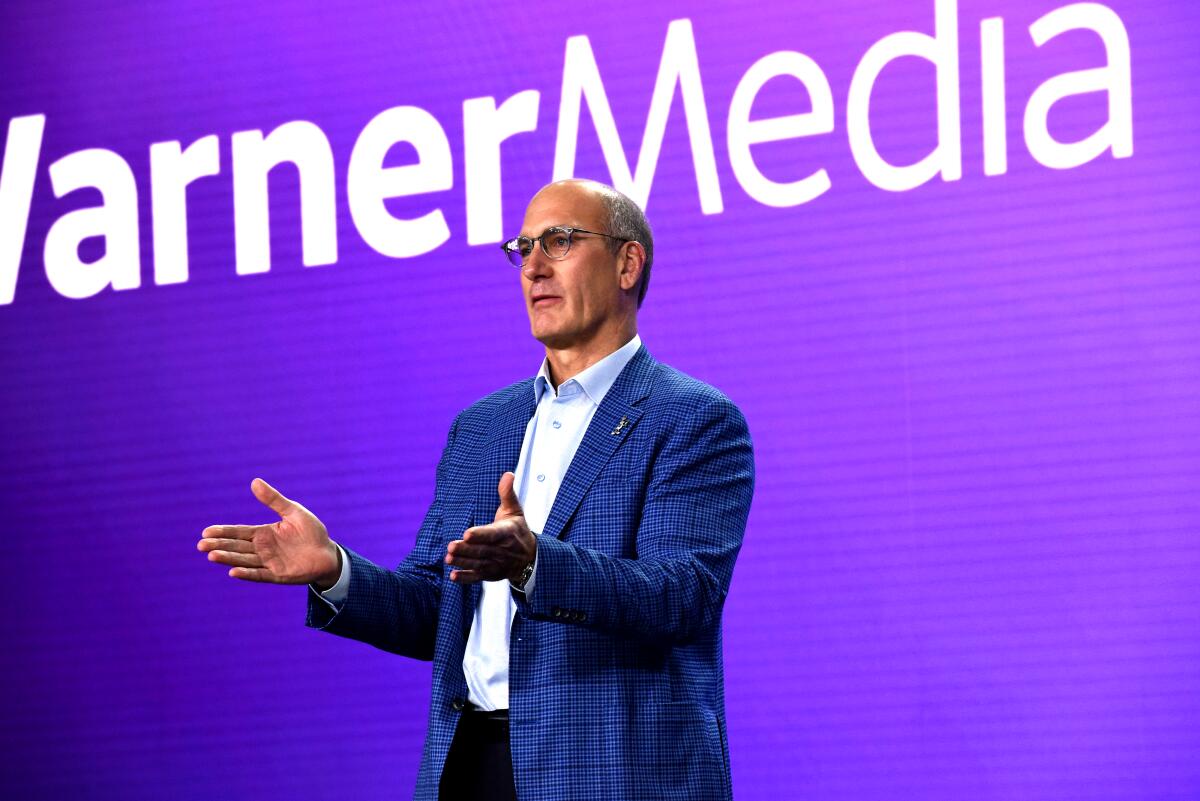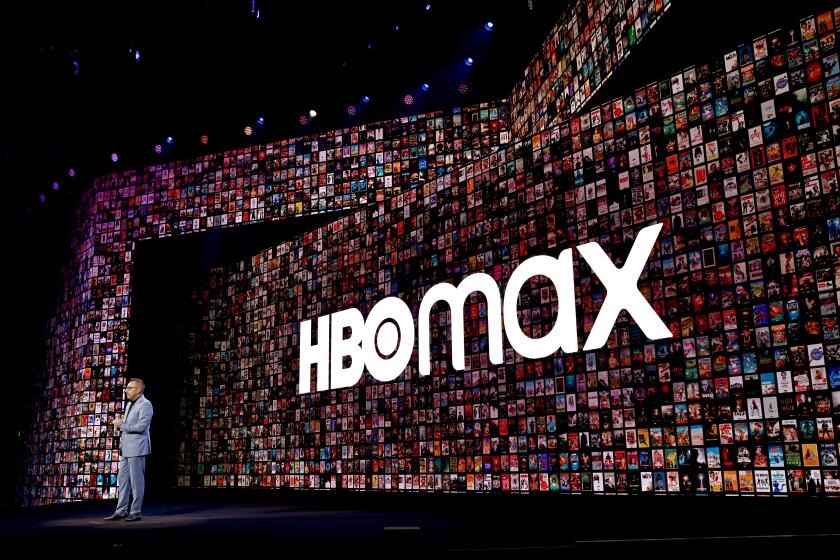AT&T to spin off HBO, other WarnerMedia assets in a huge deal with Discovery. What went wrong?

- Share via
Three years ago, AT&T Inc. marched into Hollywood with big ambitions to be a 21st century media colossus, connecting its booming cellphone business with legendary media properties — HBO, the Warner Bros. film and TV studio and Turner channels including cable news juggernaut CNN.
Now, the company is retreating from those plans.
Daunted by the challenges of competing in the streaming age and shackled by a mountain of debt, the Dallas telecommunications behemoth is poised to spin off its entertainment assets into a new venture with cable programming company Discovery, which owns HGTV, the Food Network and Animal Planet, according to people familiar with the matter who were not authorized to comment.
The companies are expected to announce their proposed joint venture as early as Monday, these people said. Bloomberg News first reported that AT&T and Discovery were in advanced talks to merge their entertainment properties.
The deal would reshape Hollywood, which has already witnessed dramatic contraction after Walt Disney Co.’s $71-billion acquisition of much of Rupert Murdoch’s entertainment empire in 2019. Legacy media companies laid off thousands of workers last year during the COVID-19 pandemic as they’ve witnessed an exodus of once loyal viewers to Netflix, Amazon Prime and Disney+.
The proposed new venture would unite one of the world’s biggest producers of unscripted programming, Discovery, with WarnerMedia, a preeminent producer of movies, including “Godzilla vs. Kong” and “Wonder Woman,” and such TV shows as “Game of Thrones,” “The Voice” and “The Bachelor.”
The proposed transaction, which would require the approval of federal regulators, would mark a stunning retreat for AT&T, which spent $85 billion three years ago to buy Time Warner Inc., the owner of CNN, HBO, TBS, TNT and the storied Warner Bros. film and TV studio. AT&T now appears ready to jettison those assets — although AT&T investors are expected to remain stakeholders.
“What a dismal failure, and what an embarrassing chapter for what was once one of America’s most storied companies,” telecommunications analyst Craig Moffett said.
Company representatives declined to comment Sunday.
Many WarnerMedia executives were stunned by the news, but some industry analysts were not.
“AT&T always had to figure out what to do with WarnerMedia,” said Brian Wieser, who heads the research unit at New York advertising giant GroupM. “The company was not optimally positioned to maximize the value of WarnerMedia because it had all these other obligations.”
Discovery CEO David Zaslav will run the proposed new company, which would bring together some of the best-known TV channels and Warner Bros. studio.
AT&T found itself stretched financially as it simultaneously tried to build a nationwide 5G telephone network while ramping up spending for its year-old streaming service, HBO Max. The proposed deal with Discovery comes just three months after AT&T spun off another troubled asset, El Segundo-based DirecTV.
For Discovery, the deal would represent a major win. The New York cable programmer, which is worth $16.8 billion, has long recognized that it needed more scale to effectively compete in the streaming world. While it churns out popular nonfiction programming — including “Property Brothers,” “Diners, Drive-Ins and Dives” and “Naked and Afraid” — it lacks a large portfolio of premium scripted shows.
Discovery Chief Executive David Zaslav is expected to run the combined venture. Last year, Zaslav acquired the 3,900-square-foot Beverly Hills mansion that was home to the late movie mogul Robert Evans (“The Godfather,” “Chinatown”), telling friends that he wanted to spend more time in Los Angeles.
Another big winner could be CNN President Jeff Zucker, who also oversees WarnerMedia’s Turner Sports. Zucker announced in January that he planned to leave the company at the end of 2021, when his contract expires, but Zucker has a close friendship with Zaslav going back to the days when they were both ambitious executives scaling the corporate ranks at NBC.
A close associate of Zucker at CNN, who spoke on the condition of anonymity, said Zucker would probably stick around should Zaslav oversee the new venture. Under Zucker’s tenure, CNN has delivered strong financial results for the news channel. Insiders said he had become disillusioned by the AT&T-imposed cost-cutting that has occurred across WarnerMedia.
A Discovery-WarnerMedia combination would probably end rumors that AT&T might sell CNN. Whatever streaming service that evolves out of a new venture would probably showcase CNN, as news programming is a strong draw for consumers. In addition, CNN also has a global profile and name recognition.
AT&T’s DirecTV has lost 4 million customers in two years. Cost-cutting and big decisions loom, including whether to pay to keep exclusive rights to NFL Sunday Ticket.
Discovery’s chairman is John Malone, a shrewd investor who is largely credited as being one of the pioneers of the pay-TV business. In 1999, he sold his cable TV business to AT&T for $55 billion, becoming AT&T’s largest investor, but Malone eventually wound down his stake to concentrate on his Liberty Global business. In recent years, Malone has been outspoken about the coming age of consolidation, saying that unaffiliated media companies would find themselves too small to compete against tech giants.
AT&T has faced growing pressure from investors, many of whom were frustrated by the company’s stock price and skeptical of the company’s costly foray into entertainment — a strategy championed by AT&T Chief Executive John Stankey and his predecessor, Randall Stephenson, who retired last summer. AT&T’s acquisition spree of Time Warner in 2018 and DirecTV in 2015 left the company heavily indebted. As of March 31, the company had $180 billion in debt.
In recent years, AT&T’s stock has underperformed — closing Friday at $32.24 — despite a huge run-up in competing media stocks, including Walt Disney, ViacomCBS, Comcast Corp. and Charter Communications Inc. AT&T’s shares traded around $39 when it announced the Time Warner deal in late October 2016.
WarnerMedia has experienced upheaval since Stankey took control of the media company in June 2018.
He instructed his lieutenants to focus on building toward the streaming future, but there were immediate clashes. Veteran Time Warner executives resisted, believing that the phone executives knew little about running best-in-class entertainment businesses. Within months, much of the top brass — including Time Warner CEO Jeff Bewkes, HBO chief Richard Plepler and Turner Broadcasting chief John Martin —was gone. Adding to the turmoil, Warner Bros. studio chief Kevin Tsujihara was forced to resign amid a sex scandal with an actress.
New high-level managers were hired as WarnerMedia sped toward its May 2020 launch of HBO Max. The rollout, in the middle of the pandemic, was complicated by the shutdown of TV and movie production. The HBO Max launch came just three months after the lackluster debut of another streaming service, AT&T TV, which was positioned as the next generation of DirecTV. AT&T TV, which offers live television channels, was a disappointment.
While HBO Max has grown its subscriber base over the last 11 months — it boasts 44 million subscribers to the legacy HBO channels and HBO Max — it lags far behind Netflix, which has more than 200 million subscribers worldwide. Burbank-based Disney is another early winner in the streaming wars.
AT&T last year committed to spend $2 billion on original content for HBO Max, but that is just a fraction of Netflix’s $16-billion-a-year content budget.
Inside WarnerMedia, top executives lobbied to increase the programming budget for HBO Max, requesting $4 billion a year to create programming, but were rebuffed, according to a former executive who was not authorized to comment. Instead, the service relies heavily on the rich treasures from the Warner Bros. and HBO libraries of content, including “Game of Thrones,” “Friends” and “Casablanca.”
Stankey last year tapped former Hulu architect Jason Kilar to lead the company. Kilar oversaw restructurings that cutt 2,000 jobs. He also angered Hollywood producers and directors with WarnerMedia’s strategy to release movies in theaters the same day they premiere on HBO Max. It’s unclear what role he will have in the new company.
Additionally, HBO Max suffered because it is among the most expensive streaming services in the market, costing subscribers $14.99 a month.
The deal, unveiled Thursday, gives TPG a 30% stake. The deal values the company at $16.25 billion, a fraction of DirecTV’s value just six years ago.
Industry executives said Sunday they expect the new venture to be structured similar to the AT&T’s spinoff of DirecTV.
In February, after losing millions of subscribers, AT&T said it would transfer all of its U.S.-based pay-TV businesses, including AT&T TV and U-Verse, into a new company called DirecTV. AT&T plans to own 70% of the new entity. Its partner, TPG Capital, agreed to pay $1.8 billion for its 30% stake in the company and assumed management control.
Discovery’s streaming service, Discovery+, has 15 million subscribers worldwide.
Zaslav has touted Discovery+ — the company’s streaming service launched in January — as a second purchase for consumers who already had Netflix or Disney+.
He told CNBC in December he fully expected consolidation in the streaming landscape.
“Will there be three? Will there be four? There’s not going to be seven,” Zaslav said. “In some way, it will be re-conjugated. We think there will be a re-bundling. That re-bundling — our job is to make sure we’re absolutely essential…. But I’m not sure anybody has all the cards.”
More to Read
Inside the business of entertainment
The Wide Shot brings you news, analysis and insights on everything from streaming wars to production — and what it all means for the future.
You may occasionally receive promotional content from the Los Angeles Times.















